Medical Guardian vs. Bay Alarm Medical, Hands-On Comparison
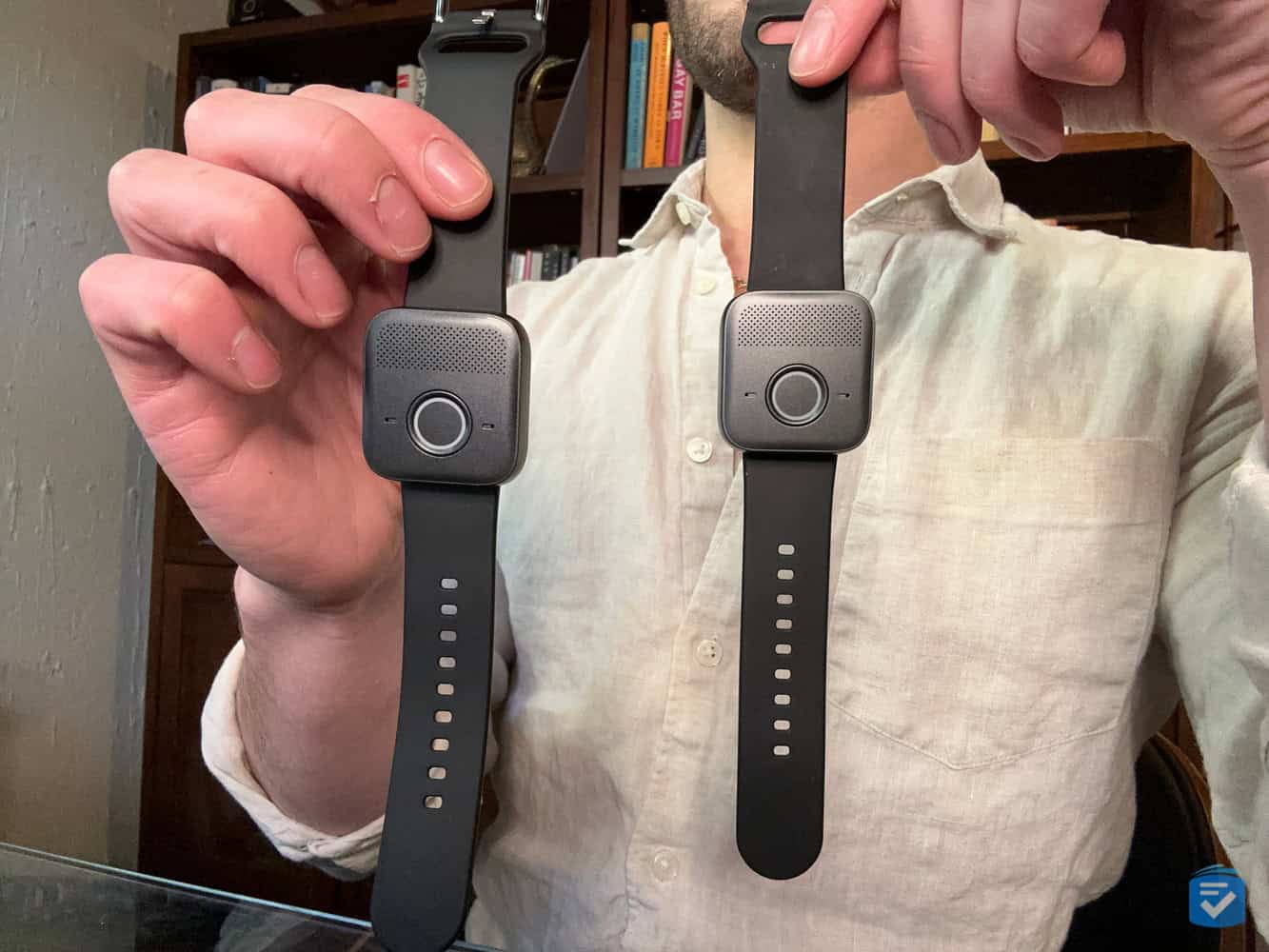
In 2023, there were 41,400 preventable deaths from falls among U.S. adults 65 and older, according to the latest data from the National Safety Council. Seniors have higher rates of death from falls than any other age group, so it’s important to protect yourself at home. This is especially true if you live alone, as 27 percent of all U.S. adults 60 and older do, according to the Pew Research Center.
Medical alert systems can help ensure you get the help you need in the event of a fall. Two of the biggest players in terms of market share are Bay Alarm Medical and Medical Guardian, based on a 2024 report from Data Bridge Market Research. But while Bay Alarm is slightly cheaper, our tests revealed that the company’s emergency response times were twice as long — and every second counts during a fall. Which provider is right for you? On this page, we’ll compare the two in terms of performance, packages, and costs to help you make this important decision.
FYI: Bay Alarm Medical and Medical Guardian performed well in our tests, but neither is the most affordable company on the market. To find medical alert systems for $20 per month, read our rundown of this year’s top-rated medical alerts.
Why Trust TheSeniorList.com?
TheSeniorList.com team of caregivers, experts, and health-care professionals conducted over 5,000 hours of in-depth research and tests to recommend the most reliable brands and devices. In this process, our team:
- Tested 50 medical alert devices from 15 different brands.
- Surveyed 1,250 seniors and caregivers on medical alert system usage in our medical alert system consumer usage study.
- Consulted with nurses, EMTs, and caregivers who are experts at caring for older adults.
- Published dozens of videos that demonstrate our medical alert system testing process.
- Evaluated verified customer reviews of medical alert companies from the Better Business Bureau.
How We Test Medical Alert Systems
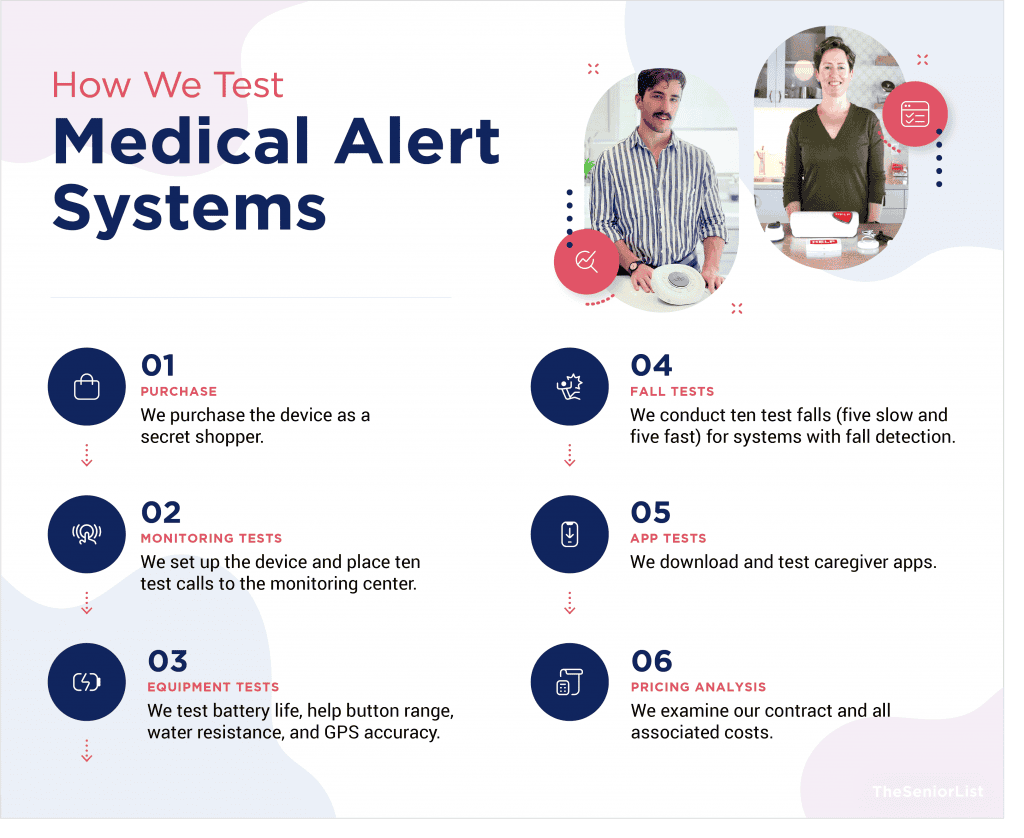
Methodology
Most medical alert companies sell a variety of systems, including smartwatches and in-home and mobile systems. Each device has its own unique features, but they all offer the same basic function: connecting users to help in an emergency. With this in mind, we evaluate every medical alert system based on the following criteria:
- Response times: The faster a medical alert system connects you to help, the better. For each system, we performed 10 test calls, counted how long it took to receive a response, and calculated an average.
- Ease of use: In an emergency, it’s important that a user can successfully activate their system. So, we carefully evaluated each device’s design, with simplicity top of mind.
- Customer care: A human touch is key to caregiving. With this in mind, medical alert companies must offer impeccable customer service, from their agents at monitoring centers to their support personnel.
- Pricing and contracts: We analyze devices’ subscription costs, contract requirements, and other fees associated with a medical alert system purchase.
- Extra features: We test out voice commands, caregiver apps, fall detection, activity monitoring, and any other features included with a medical alert system.
Bay Alarm Medical vs. Medical Guardian
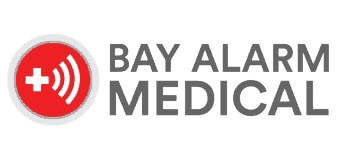
|

|
|
|---|---|---|
| Editor's Ratings | ||
| Starting Price (Home System) |
|
|
| Starting Price (Mobile System) | $29.95 per month | $149.95 for equipment; $36.95 per month w/annual contract |
| Minimum Contract Requirement | 1 month | 1 month |
| Average Response Times | 16 seconds | 8 seconds |
| Fall Detection | $10 to $20 per month | $10 per month |
| Caregiver App | Included | Included |
| Smartwatch Option | Yes | Yes |
| Contact | ||
| Phone Number |
Call for best price:
855-675-0754 |
Call for best price:
877-947-4512 |
| Website | View Packages Links to Bay Alarm Medical | View Packages Links to Medical Guardian |
Bay Alarm Medical Systems Overview
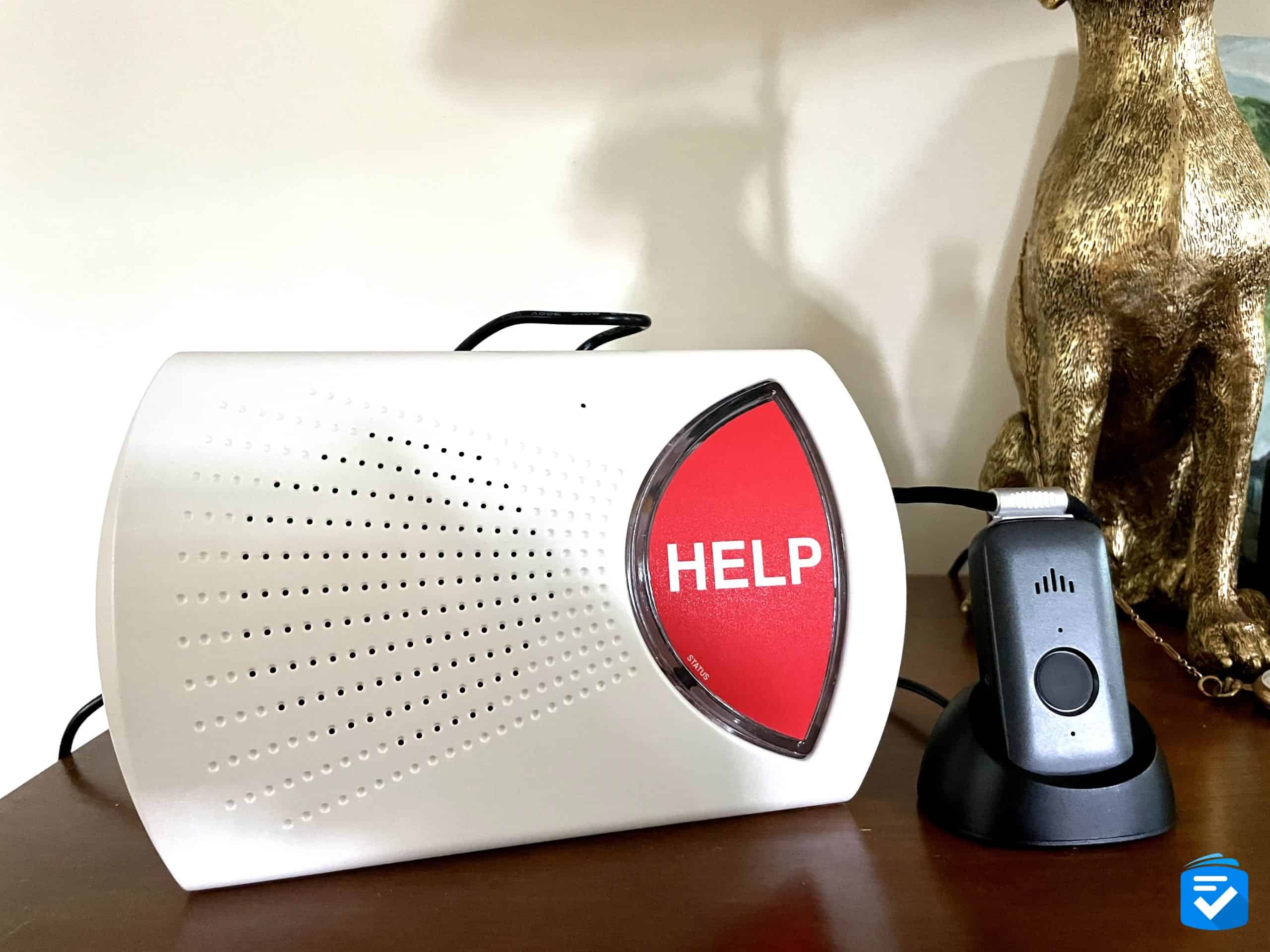
One of the most affordable medical alert companies, Bay Alarm Medical, is also one of our favorites. This distinction is due to the company’s simple devices that offer ample protection. For in-home devices, the company offers the SOS Home, which you can use with a cellular or landline connection. For mobile systems, they offer the SOS Micro, the SOS All-In-One, which combines home and mobile systems, and the SOS Smartwatch.
In our tests with Bay Alarm Medical systems, the monitoring agents answered our calls in an average of 16 seconds, which is faster than average. The company’s response agents were also professional and helpful. To learn more about our experience with this company, check out our Bay Alarm medical alert review.
Bay Alarm Medical Devices Compared
| System | Monthly Cost | For Use | Additional Features |
|---|---|---|---|
| SOS Home |
|
At home |
|
| SOS All-In-One | $34.95 | At home and on the go |
|
| SOS Micro | $29.95 | At home and on the go |
|
| SOS Smartwatch | $39.95 | At home and on the go |
|

Medical Guardian System Overview
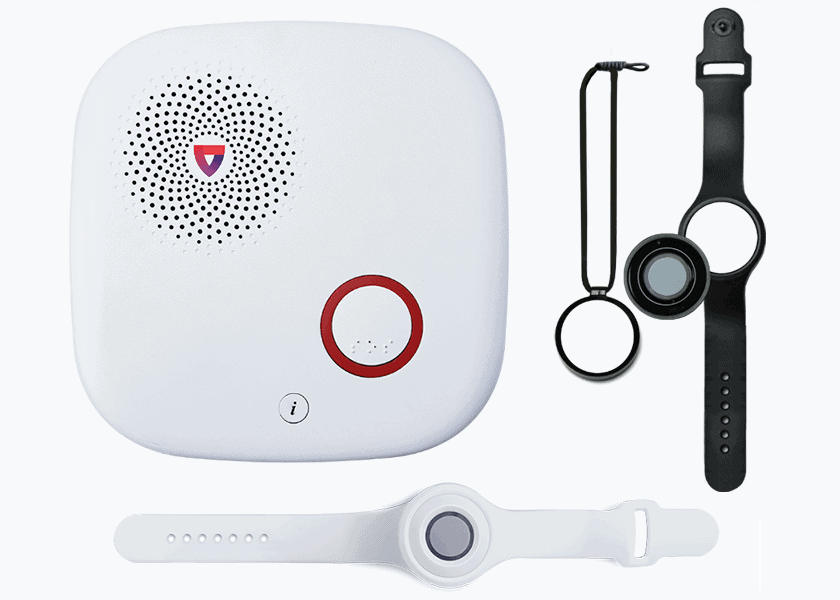
Medical Guardian currently offers five systems. The MGClassic and MGHome Cellular are the company’s at-home systems, and the MGMini, MGMini Lite, and MGMove are all mobile systems. Regardless of the particular product, we found the Medical Guardian response agents answered our test calls in only eight seconds on average, which is half the time of Bay Alarm Medical. To learn more about our hands-on experience testing these devices, read our full Medical Guardian review.
Medical Guardian Devices Compared
| System | Monthly Starting Cost (With Annual Contract) | For Use | Additional Features |
|---|---|---|---|
| MGClassic | $27.95 | At home |
|
| MGHome Cellular | $34.95 | At home |
|
| MGMini | $36.95 | At home and on the go |
|
| MGMini Lite | $42.95 | At home and on the go |
|
| MGMove | $38.95 | At home and on the go |
|
Costs and Contracts
Medical Guardian and Bay Alarm Medical have a similar approach to contracts. Both companies allow you to subscribe on a month-to-month basis. While long-term contracts aren’t required, Medical Guardian offers discounted prices if you pay annually or quarterly up front.
In terms of actual costs, Bay Alarm Medical prices are objectively lower on all systems. The company’s in-home and mobile systems cost roughly $10 less per month than comparable devices from Medical Guardian. Plus, Medical Guardian charges for equipment, while Bay Alarm does not, which will cost you an extra $149.95 to $199.95 up front.
Overall, Medical Guardian systems cost more than those from Bay Alarm Medical.
FYI: Medical Guardian systems are not the cheapest. To find more budget-friendly options, read my guide to the most affordable medical alert systems.
Performance
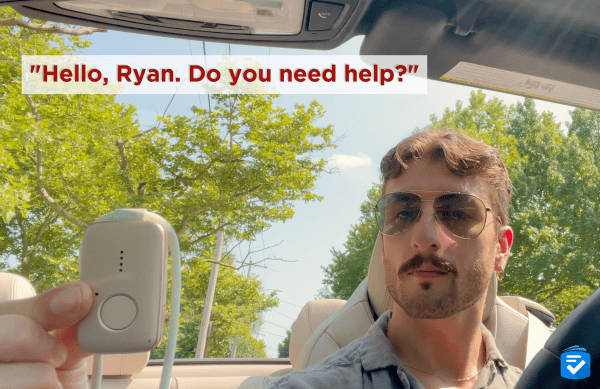
Although Medical Guardian systems cost a bit more, they performed slightly better in our tests. In our series of 10 test calls with each Medical Guardian system, we received responses in an average of eight seconds. This is the fastest response time of any medical alert company.
Bay Alarm Medical systems, on the other hand, took an average of 16 seconds to connect us to help. Even though that’s twice as long as Medical Guardian’s response times, we should note that 16 seconds is still faster than average.
We found that both companies’ fall detection worked well. However, there was some variation among devices. The MGMini Lite, for example, detected eight out of 10 test falls, while the MGMini detected only one. Bay Alarm Medical systems performed similarly in terms of fall detection, capturing between six and eight out of 10 test falls.
Our Top Choice
When it comes down to it, there’s no wrong choice between Bay Alarm and Medical Guardian; they’re two of the top medical alert systems. Each provides durable equipment and excellent customer service. Plus, they both bring a wide range of devices that can protect you both in and out of the home. Perhaps most importantly, neither company requires long-term contracts.
The primary difference, in our eyes, is pricing. If you’re looking for something slightly more affordable, Bay Alarm Medical is likely the better option. If, however, you don’t mind paying extra for slightly faster response times, then Medical Guardian is a great choice.
Frequently Asked Questions
-
Which is better: Bay Alarm Medical or Medical Guardian?
Bay Alarm Medical systems cost slightly less, while Medical Guardian systems gave us slightly faster response times. Both companies consistently rank among our favorite medical alert companies.
-
Does Bay Alarm Medical have the same equipment as Medical Guardian?
Occasionally, Bay Alarm Medical and Medical Guardian offer identical systems under different names. For example, the SOS Micro and the MGMini Lite are the same device, just marketed differently. However, the majority of the equipment is different.
-
Does Bay Alarm Medical or Medical Guardian have better fall detection?
Fall detection varies by each company’s particular system. However, we’ve found that the MGMini Lite and SOS Mobile offer accurate fall detection.

